Trip Info: Packing List
The packing list was created from decades of Grand Canyon rafting experience, please follow it (even a fleece in summer!). You will be traveling through remote wilderness areas with the possibility of extreme, unpredictable weather and large temperature swings. As your trip approaches, we recommend checking the weather in the canyon at Phantom Ranch. Follow the packing list below, and use the forecast to determine the need for extra warm or cold weather items. Remember, it is better to have and not need, than to need and not have. Being prepared goes a long way towards an enjoyable trip. For those of you flying to the area, we suggest carrying absolute river necessities in a carry-on bag. It is tough to get things together if your luggage is lost by the airline.
Note: It is very important to keep your weight to a minimum to make the hike less difficult. You must limit your gear to 25 lbs or less. Find many of these items in our online store and check out our blog for more insider info.
The video talks about a duffel bag, but because you are hiking the Bright Angel Trail, you’ll be packing all of your gear in a backpack instead.
Required
Clothing
Optional Extra Items
Personal Items
What We Provide
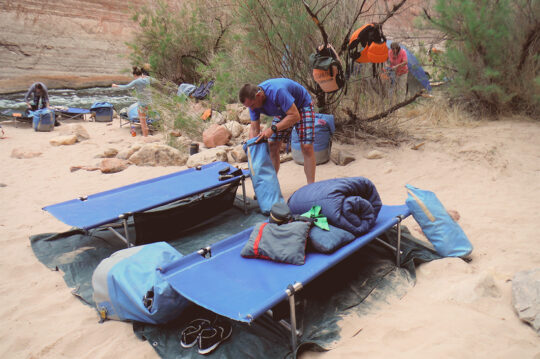
Grand Canyon rafting is a unique adventure. Once we embark into the canyon, we are self-sufficient and self-contained for the duration of the trip. This means packing well is important as there are no stores to supplement things you may have forgotten. We have put a great amount of thought and care into our packing list, and we ask that you trust our experience!
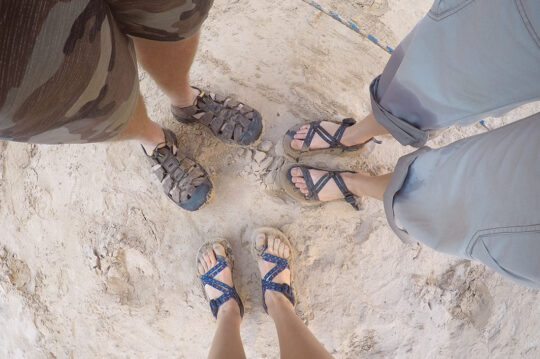 Investing in a good pair of river sandals/shoes is crucial to navigating the various slippery surfaces you’ll encounter. “Aqua socks” are not a good option. Getting on and off the rafts can be surprisingly challenging as the rafts are often moving and the side tubes can be extremely slippery. To help maneuver on these surfaces your river shoes should have grippy tread and attach securely to your foot with laces/straps. For optimal comfort make sure your shoes are broken in before the trip as you’ll be spending a majority of each day in these shoes. River sandals tend to be the most popular choice as they have all of these features and are great for the numerous side hikes on unmaintained backcountry trails which may be through water. Amphibious shoes are another good choice as they provide toe protection in addition to traction in both wet and dry conditions. We recommend Chaco, Keen, Bedrock, or Merrell for excellent river sandals/shoes.
Investing in a good pair of river sandals/shoes is crucial to navigating the various slippery surfaces you’ll encounter. “Aqua socks” are not a good option. Getting on and off the rafts can be surprisingly challenging as the rafts are often moving and the side tubes can be extremely slippery. To help maneuver on these surfaces your river shoes should have grippy tread and attach securely to your foot with laces/straps. For optimal comfort make sure your shoes are broken in before the trip as you’ll be spending a majority of each day in these shoes. River sandals tend to be the most popular choice as they have all of these features and are great for the numerous side hikes on unmaintained backcountry trails which may be through water. Amphibious shoes are another good choice as they provide toe protection in addition to traction in both wet and dry conditions. We recommend Chaco, Keen, Bedrock, or Merrell for excellent river sandals/shoes.
Ideally, you should bring 1 pair of river sandals/ shoes, 1 pair of hiking or tennis/athletic shoes, 1 pair of flip-flops to wear in camp, and several pairs of socks. For your 8-mile hike, some prefer above-ankle hiking boots while others like lighter trail running shoes. Lean on your own experience to make this choice. Your hiking shoes don’t need to fit in your duffel, they can be stored in the community shoe bag that will be accessible during the day. Flip-flops or Crocs are nice to bring so you can give your feet a break and switch out of wet, sandy river shoes once you’re at camp for the evening. Watch out for blisters and sore spots due to rubbing and abrasive sand under the river shoe straps. Socks are a great way to help combat these issues, protect your feet from the sun, and keep them happy. Look for socks that are synthetic or wool instead of cotton. If you tend to run cold, wool socks can also help as they maintain heat when wet, or consider bringing neoprene booties/socks. Having proper footwear goes a long way towards an enjoyable trip!
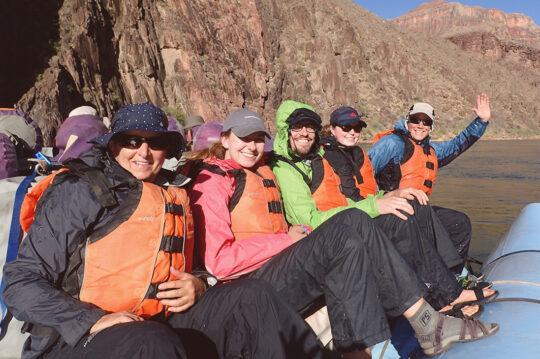 It is important to have a quality rain jacket with a hood and rain pants. Because the river is very cold year-round, you’ll use rain gear as a splash guard from the rapids. Even on the hottest days, guests often wear rain gear in the morning, while going through rapids, and in the shade of the canyon walls. Make sure your rain gear is waterproof, not just water-resistant. Rain gear with the ability to cinch at the neck and wrists works well. A poncho is not effective. Do NOT go on your river trip without rain gear!
It is important to have a quality rain jacket with a hood and rain pants. Because the river is very cold year-round, you’ll use rain gear as a splash guard from the rapids. Even on the hottest days, guests often wear rain gear in the morning, while going through rapids, and in the shade of the canyon walls. Make sure your rain gear is waterproof, not just water-resistant. Rain gear with the ability to cinch at the neck and wrists works well. A poncho is not effective. Do NOT go on your river trip without rain gear!
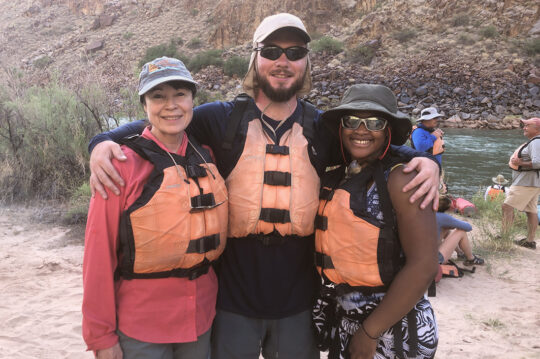 You will pack your backpack in our waterproof bags when you get to the river. Quick-drying clothing is highly recommended. Many of our guides wear long-sleeved shirts every day for sun protection. If it is overcast, it can turn chilly, so pack a fleece jacket to wear under your rain gear, no matter the time of year. You do not need a change of clothes for every day; many people wear the same outfit for several days. Follow the packing list and remember “less is more!”
You will pack your backpack in our waterproof bags when you get to the river. Quick-drying clothing is highly recommended. Many of our guides wear long-sleeved shirts every day for sun protection. If it is overcast, it can turn chilly, so pack a fleece jacket to wear under your rain gear, no matter the time of year. You do not need a change of clothes for every day; many people wear the same outfit for several days. Follow the packing list and remember “less is more!”
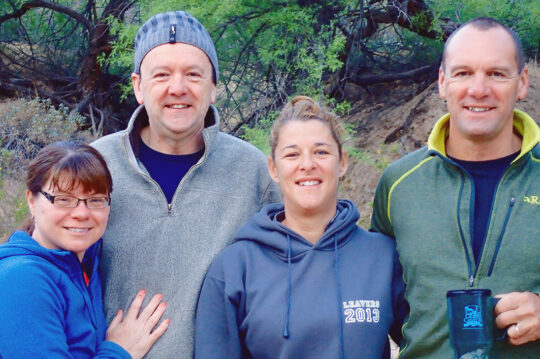 If your trip is in the early or late season (April/May or September/October), it is very important to bring additional warm clothing. These months tend to have cooler temperatures, cloudy skies, and the potential for storms. In addition to the items on the packing list, we recommend bringing layers including long underwear, fleece/warm pants, warm hat and gloves, warm socks, and neoprene socks/booties. Layering clothing under waterproof rain gear works well as being splashed by rapids on the river can make it feel much colder. We recommend having an additional set of warm, dry clothes, and maybe a puffy jacket for camp. We strongly suggest you bring these items and be happy if you don’t have to use them!
If your trip is in the early or late season (April/May or September/October), it is very important to bring additional warm clothing. These months tend to have cooler temperatures, cloudy skies, and the potential for storms. In addition to the items on the packing list, we recommend bringing layers including long underwear, fleece/warm pants, warm hat and gloves, warm socks, and neoprene socks/booties. Layering clothing under waterproof rain gear works well as being splashed by rapids on the river can make it feel much colder. We recommend having an additional set of warm, dry clothes, and maybe a puffy jacket for camp. We strongly suggest you bring these items and be happy if you don’t have to use them!
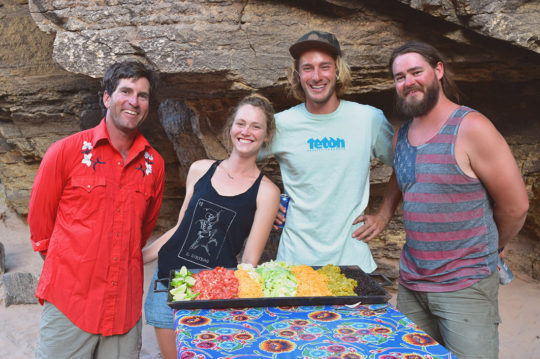 It is customary, upon receiving a satisfactory experience, to tip the river guides. It is an acknowledgement of a job well done and is greatly appreciated by the crew members. A common tip is 8-10% of the total river trip cost. You may leave cash or a check (bring a blank one to fill out on the river) with the trip leader, who will distribute it evenly among the crew. Please come prepared as you will NOT be able to tip with a credit/debit card nor apps like Venmo.
It is customary, upon receiving a satisfactory experience, to tip the river guides. It is an acknowledgement of a job well done and is greatly appreciated by the crew members. A common tip is 8-10% of the total river trip cost. You may leave cash or a check (bring a blank one to fill out on the river) with the trip leader, who will distribute it evenly among the crew. Please come prepared as you will NOT be able to tip with a credit/debit card nor apps like Venmo.
